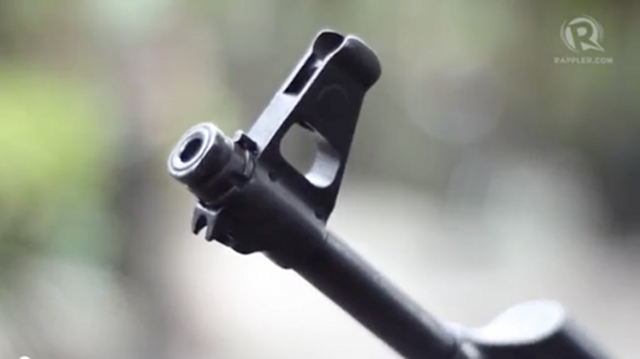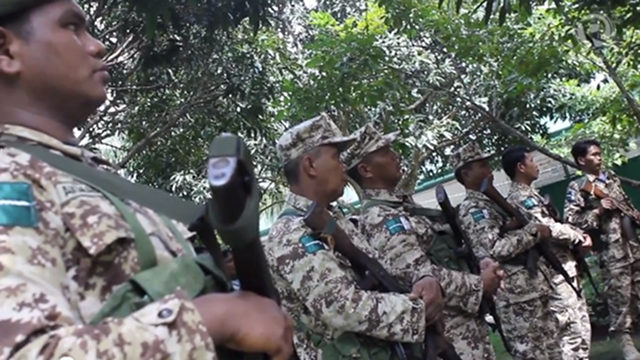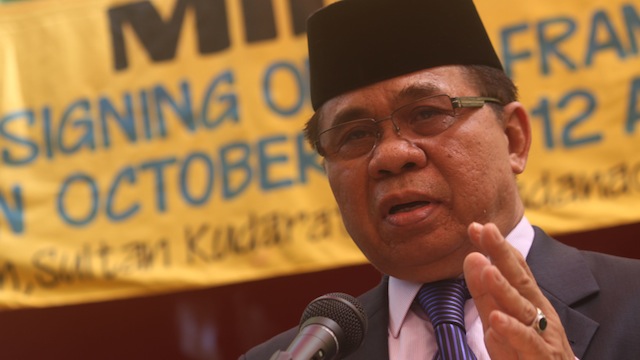SUMMARY
This is AI generated summarization, which may have errors. For context, always refer to the full article.

MAGUINDANAO, Philippines – It sounds promising, as explained by the leader of the Philippines’ biggest Muslim rebel group in a rare press conference.
In a gated portion of the main camp of the Moro Islamic Liberation Front (MILF), its chair Murad Ebrahim said a final peace deal with the Philippine government would make guns unnecessary for the group’s 12,000 fighters. Why hold on to firearms, he said, if the deal will produce justice and a booming economy?
The road to a final political settlement, which is envisioned by 2016, has begun with the signing of an initial Framework Agreement in October.
But on the dirt road leading out of Camp Darapanan, MILF troops admitted they find the decommissioning of firearms unthinkable. While it is one of the landmark provisions of the initial agreement on the Bangsamoro region, it is also among the most contentious.
MILF troops have embraced their firearms, after all, as more valuable than their wives following decades of armed rebellion. (Watch more in the video below.)
“Dito lang namin makuha kumbaga ‘yung kapayapaan, dito sa baril namin,” explained Hajji (not his real name), in an interview with Rappler after Murad’s press conference last Saturday, October 27. (This is how we will achieve peace, through our firearms.)
Hajji said he will, of course, follow his leaders if they order them to lay down their firearms. But he indicated some resistance. “Bibitawan din – pero pupulutin din. Hindi puwede ‘yang bitawan,” he said. (We will give it up – but we will take it up again. We cannot completely give it up.)
His companion, Mujiv (not his real name), explained that peace should precede the laying down of firearms. “Hindi lang ‘yung walang digmaan. Dapat may self-determination. Kung makuha na ‘yon, ‘yun na ‘yung totoong peace,” Mujiv said. (It’s not enough to end war. We should have self-determination. Once we achieve that, then we will have genuine peace.)
Distrusting gov’t
An MILF company commander, Abdul Sharif, admitted divisions in their ranks regarding the decommissioning of firearms.
“Hindi natin sila masisisi,” Abdul said. (We cannot blame them.)
He said this attitude comes from factors such as the botched Memorandum of Agreement on Ancestral Domain in 2008, which the Arroyo administration tried to seal with the MILF but which the Supreme Court eventually declared unconstitutional. “Nakita nila na parang niloloko lang sila ng gobyerno.” (They saw the government could be fooling them.)
He also said a decades-old culture, which was formed by their armed rebellion, complicates the situation.

“As a revolutionary, mas mahigit pa ‘yung baril kaysa asawa. Kasi siyempre, as a revolutionary, meron kaming ideolohiya… Aanhin mo naman ang asawa? Hindi mo naman puwedeng gamitin ‘yan sa kalaban,” Abdul said.
(As revolutionaries, we value our guns more than our wives. Because as revolutionaries, we have ideologies… What will we use our wives for? We cannot use them in combat.)
An MILF splinter group, the Bangsamoro Islamic Freedom Movement (BIFM), could also attract MILF members who refuse to lay down their arms. The BIFM disagrees with the signing of the Framework Agreement, and insists on forming a separate Bangsamoro state.
Good economy is key?
In his press conference, Murad acknowledged the value his troops give their firearms. But Murad said he is banking on potential economic gains after the final peace deal is sealed.
“What is important is, it will immediately affect the social and economic conditions of the people in the area, including our fighters. We will be focusing more on livelihood programs, basic necessities, and health and education,” Murad said.
He said it is but “logical” to think MILF fighters will abandon their guns due to the peace deal. “People aspire to have their firearms because they feel insecure,” Murad said.

“That is what we are looking forward to – when there is security, when there is justice, when they are served with their basic necessities, then I’ll say, I’ll marry another 3 wives,” added the MILF chair, eliciting laughter as he referred to the saying on guns and spouses.
The Philippine government and the MILF return to negotiations in Kuala Lumpur this month to discuss decommissioning, among other things.
“Hindi po madali na i-surrender ‘yung firearms immediately upon the signing of just a document. Kailangan po may makita na delivery ng political promises on the side of the government,” said the government’s chief negotiator, Marvic Leonen. (It’s not easy to surrender firearms immediately upon the signing of just a document. There has to be a delivery of political promises on the side of the government.)
But what will happen first – the decommissioning of firearms or the improvement of the Bangsamoro economy and the resulting peace? With MILF troops like Mujiv wanting better security before giving up their guns, it could well become a chicken-and-egg problem. – Rappler.com
Add a comment
How does this make you feel?
There are no comments yet. Add your comment to start the conversation.